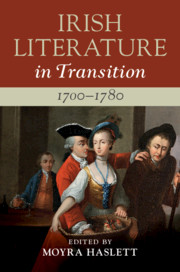Book contents
- Irish Literature in Transition, 1700–1780
- Irish Literature in Transition
- Irish Literature in Transition, 1700–1780
- Copyright page
- Contents
- Illustrations
- Contributors
- Series Preface
- General Acknowledgements
- Introduction
- Part I Starting Points
- Part II Philosophical and Political Frameworks
- Part III Local, National, and Transnational Contexts
- Part IV Gender and Sexuality
- Chapter 11 The Province of Poetry: Women Poets in Early Eighteenth-Century Ireland
- Chapter 12 Queering Eighteenth-Century Irish Writing: Yahoo, Fribble, Freke
- Chapter 13 ‘Brightest Wits and Bravest Soldiers’: Ireland, Masculinity, and the Politics of Paternity
- Chapter 14 Fictions of Sisterhood in Eighteenth-Century Irish Writing
- Part V Transcultural Contexts
- Part VI Retrospective Readings
- Index
Chapter 14 - Fictions of Sisterhood in Eighteenth-Century Irish Writing
from Part IV - Gender and Sexuality
Published online by Cambridge University Press: 28 February 2020
- Irish Literature in Transition, 1700–1780
- Irish Literature in Transition
- Irish Literature in Transition, 1700–1780
- Copyright page
- Contents
- Illustrations
- Contributors
- Series Preface
- General Acknowledgements
- Introduction
- Part I Starting Points
- Part II Philosophical and Political Frameworks
- Part III Local, National, and Transnational Contexts
- Part IV Gender and Sexuality
- Chapter 11 The Province of Poetry: Women Poets in Early Eighteenth-Century Ireland
- Chapter 12 Queering Eighteenth-Century Irish Writing: Yahoo, Fribble, Freke
- Chapter 13 ‘Brightest Wits and Bravest Soldiers’: Ireland, Masculinity, and the Politics of Paternity
- Chapter 14 Fictions of Sisterhood in Eighteenth-Century Irish Writing
- Part V Transcultural Contexts
- Part VI Retrospective Readings
- Index
Summary
In this chapter, female homosocial relationships are explored as confident articulations of female identity and as suggestive models of political governance. Despite widespread anxiety about female-only assembly and scepticism regarding the virtues of female friendship, women writers in this period evidently found friendship between women to be a theme in which they could articulate and explore a range of feelings and emotions not otherwise sanctioned by their culture. The chapter considers a range of poetry and fiction – by Charlotte McCarthy, Margaret Goddard, Olivia Elder, Frances Sheridan, and her daughter Elizabeth – in relation to differentially situated ideas of ‘sisterhood’ before turning to the ways in which Ireland came to be figured as a ‘sister’ kingdom to Britain in the later century, thus shaping the proto-feminism of earlier traditions in new, national formations.
Keywords
- Type
- Chapter
- Information
- Irish Literature in Transition, 1700–1780 , pp. 284 - 304Publisher: Cambridge University PressPrint publication year: 2020

